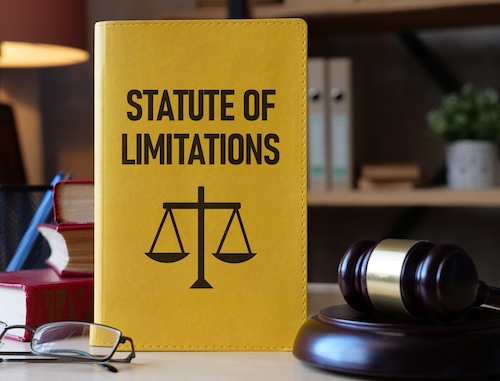How Long After a Car Accident Can You Sue?
After a car accident, time is limited to take legal action. Georgia law sets strict deadlines for filing personal injury claims, property damage claims, and wrongful death lawsuits. Missing these deadlines can prevent you from recovering compensation for medical bills, lost wages, and other losses.
In this blog, you will learn how Georgia’s statute of limitations affects your right to sue after a car accident, what exceptions may apply, and why working with an experienced Kennesaw car accident lawyer can help you file your claim on time and protect your right to compensation.
The Statute of Limitations for Car Accident Lawsuits in Georgia
Knowing how long after a car accident you can sue in Georgia is critical to protecting your legal rights and securing compensation.
Personal Injury Claims: Two-Year Deadline
In Georgia, the statute of limitations for filing a personal injury lawsuit after a car accident is two years. This time limit is set by O.C.G.A. § 9-3-33. It applies to any injured party, including drivers, passengers, pedestrians, or cyclists who suffer car accident injuries. The two-year period begins on the date of the accident.
If you miss this deadline, the court will likely dismiss your case. This makes it important to act quickly. Waiting too long can end your right to seek compensation for medical bills, lost wages, and other damages.
What the Statute Covers
The two-year statute covers most types of personal injury cases, including serious injuries, wrongful death claims, and other personal injury claims connected to a car crash. It applies whether you are suing the at fault party or filing against another driver’s insurance policy.
Car accident victims should not rely on the insurance company to protect their interests. It is often in your best interest to speak with a car accident lawyer early in the legal process.
Why This Deadline Matters
The statute of limitations affects your ability to file a claim and seek full compensation. Even if you have a strong case, missing the legal deadline blocks your access to the court system. Car accident claims that start within the two-year window have a better chance at fair settlement or judgment.
Property Damage Claims: Different Deadline
Not all legal claims from a car accident follow the same timeline, especially those involving property damage.
Four-Year Deadline for Property Damage
In Georgia, the deadline to file a lawsuit for vehicle or other property damage is four years from the date of the accident. This rule comes from O.C.G.A. § 9-3-31. It gives car accident victims more time to pursue claims for the cost to repair or replace a vehicle or other damaged property.
The longer deadline applies only to property-related losses. It does not affect the two-year limit for personal injury claims. If your accident caused both physical injuries and property damage, you will need to follow both deadlines.
What Property Damage Claims Cover
Property damage claims typically include the cost to repair your vehicle, the total loss value if the car is not repairable, and sometimes damage to other items such as personal belongings inside the vehicle. These claims are usually made through the other party’s insurance company or your own insurance policy.
Even with more time, it is best to start the claims process early. Insurance companies may delay or deny payment if records or evidence are incomplete. Having a car accident lawyer involved can improve your chances of receiving full compensation.
Why Timing Still Matters
Although the law allows four years, waiting can hurt your case. Evidence can be lost, vehicles may be repaired without proper documentation, and the other party might dispute fault. Filing a claim soon after the car crash ensures that you have the proof needed to hold the liable party responsible.
When the Clock Starts: Understanding the Limitations Countdown
The time limit to file a car accident lawsuit in Georgia does not begin at a random point. It starts from a specific event defined by law.
The Standard Start Date
In most car accident cases, the statute of limitations begins on the date the accident happens. This is when the injured party knows or should know that they have been harmed. Whether the claim involves personal injury, property damage, or wrongful death, the countdown usually starts that day.
This rule applies even if you plan to handle the issue through the insurance company first. The legal time period to file a lawsuit continues to run, even during settlement discussions.
Delayed Discovery of Injuries
Some car accident injuries are not obvious at first. Pain or symptoms might show up days or weeks later. In Georgia, this does not usually delay the statute of limitations. The clock still starts on the date of the crash.
For this reason, it is important to seek medical attention immediately, even if you do not feel injured. Medical records from the early stages help support your personal injury claim and protect your legal rights.
Legal Exceptions to the Start Date
There are limited cases where the countdown is delayed. If the injured person is legally incompetent or under 18, the limitations period may be paused. Once the person becomes competent or turns 18, the countdown begins. These rules apply only in specific situations and should be reviewed with a personal injury attorney.
Exceptions That May Extend the Deadline
Georgia law includes a few exceptions that can extend the time limit to sue after a car accident, but these apply in limited situations.
Minors Involved in the Accident
If the injured party is under 18 at the time of the car accident, the statute of limitations does not start right away. Instead, the two-year countdown begins on the minor’s 18th birthday. This rule gives minors time to file a personal injury lawsuit once they reach legal age.
Even though the law allows extra time, it is still important for parents or guardians to speak with a car accident lawyer as soon as possible. Early legal action helps preserve evidence and supports the injured party’s claim for compensation.
Legal Incompetence
If the injured person is declared legally incompetent due to mental illness or disability, Georgia law may delay the start of the limitations period. The statute of limitations will begin only when the person is no longer legally incompetent.
This exception exists to protect the rights of people who are unable to make legal decisions. A personal injury attorney can evaluate the situation and confirm if this exception applies.
Wrongful Death Cases
In cases involving a wrongful death claim, the two-year time limit usually begins on the date of death, not the date of the car crash. If the death occurs days or weeks after the accident, the statute starts from the day the person dies.
The person filing the claim must be a legal representative of the deceased or an eligible family member. Speaking with a car accident attorney early ensures that the wrongful death lawsuit is filed within the correct time period.
Why Exceptions Require Legal Review
Exceptions to the statute of limitations are narrow and fact-specific. A mistake in calculating the deadline can lead to the case being dismissed. An experienced car accident lawyer can review your situation, check if exceptions apply, and make sure your legal claim is filed on time.
Consult With an Experienced Kennesaw Car Accident Attorney ASAP!
If you were hurt in a car accident and are unsure how long you have to file a claim, do not wait to get the answers you need. The legal deadlines in Georgia are strict, and missing them can cost you the chance to recover compensation for your injuries, medical bills, lost wages, and property damage. Our team at GMV Law Group is here to help.
Contact us at 404-975-4878 for a free case consultation today!







